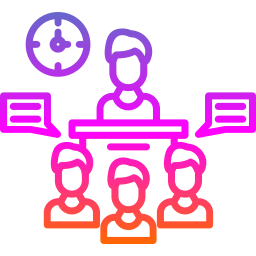Data Science Training
Our Data Science certification courses aim to accelerate your Data Science career by making you proficient in this domain. We aim to make you proficient in this field by helping you learn both basic and advanced concepts of Data Science, along with getting exposure to programming languages and technologies including Python, R, Hadoop, Tableau, and Spark. Besides, in these courses, you will gain hands-on experience working on real-time exercises and projects that will substantiate your learning.
Data Science Certification Training
Learn JavaScript – Full Course for Beginners
Key Features

Industry standard curriculum
Every technology syllabus is tailored to meet current industry requirements.

80% Hands-On Trainings
you will be getting 80% hands-On Trainings and license system access for practice

Real World Projects
Explore how technologies interacts with the real world using industrial use-cases.

Flexible Schedules
If you feel NOW is the right time, we got your schedule covered.

Official Certificate Guidance
Along with course completion certificate, we assure you with official certificate guidance.
Free Career Counselling
We are happy to help you
Data Science Certification Course FAQs
What is Data Science ?
Data science is a multidisciplinary approach to extracting actionable insights from the large and ever-increasing volumes of data collected and created by today’s organizations. Data science encompasses preparing data for analysis and processing, performing advanced data analysis, and presenting the results to reveal patterns and enable stakeholders to draw informed conclusions.
Data preparation can involve cleansing, aggregating, and manipulating it to be ready for specific types of processing. Analysis requires the development and use of algorithms, analytics and AI models. It’s driven by software that combs through data to find patterns within to transform these patterns into predictions that support business decision-making. The accuracy of these predictions must be validated through scientifically designed tests and experiments. And the results should be shared through the skillful use of data visualization tools that make it possible for anyone to see the patterns and understand trends.
As a result, data scientists (as data science practitioners are called) require computer science and pure science skills beyond those of a typical data analyst. A data scientist must be able to do the following:
- Apply mathematics, statistics, and the scientific method
- Use a wide range of tools and techniques for evaluating and preparing data—everything from SQL to data mining to data integration methods
- Extract insights from data using predictive analytics and artificial intelligence (AI), including machine learning and deep learning models
- Write applications that automate data processing and calculations
- Tell—and illustrate—stories that clearly convey the meaning of results to decision-makers and stakeholders at every level of technical knowledge and understanding
- Explain how these results can be used to solve business problems
This combination of skills is rare, and it’s no surprise that data scientists are currently in high demand.
Hadoop is an open-source project by Apache used for the storage and processing of large volumes of unstructured data in a distributed environment. Hadoop can scale up from a single server to thousands of servers. Hadoop framework is used by large giants like Amazon, IBM, New York Times, Google, Facebook, Yahoo, and the list is growing every day. Due to the larger investments companies make for Big Data the need for Hadoop Developers and Data Scientists who can analyze the data increases day by day.
Why Learn Data Science Online ?
Data scientists know how to use their skills in math, statistics, programming, and other related subjects to organize large data sets. Then, they apply their knowledge to uncover solutions hidden in the data to take on business challenges and goals. As per research conducted by IBM, Data Scientist is one of the most trending jobs of the 21st century.
What are the various job opportunity available after doing Data Science ?
Data science experts are needed in virtually every job sector—not just in technology. In fact, the five biggest tech companies—Google, Amazon, Apple, Microsoft, and Facebook—only employ one half of one percent of U.S. employees. However—in order to break into these high-paying, in-demand roles—an advanced education is generally required.
Here are some of the leading data science careers you can break into with an advanced degree.
1. Data Scientist
Average Salary: $139,840
Typical Job Requirements: Find, clean, and organize data for companies. Data scientists will need to be able to analyze large amounts of complex raw and processed information to find patterns that will benefit an organization and help drive strategic business decisions. Compared to data analysts, data scientists are much more technical.
2. Machine Learning Engineer
Average Salary: $114,826
Typical Job Requirements: Machine learning engineers create data funnels and deliver software solutions. They typically need strong statistics and programming skills, as well as a knowledge of software engineering. In addition to designing and building machine learning systems, they are also responsible for running tests and experiments to monitor the performance and functionality of such systems.
3. Machine Learning Scientist
Average Salary: $114,121
Typical Job Requirements: Research new data approaches and algorithms to be used in adaptive systems including supervised, unsupervised, and deep learning techniques. Machine learning scientists often go by titles like Research Scientist or Research Engineer.
4. Applications Architect
Average Salary: $113,757
Typical Job Requirements: Track the behavior of applications used within a business and how they interact with each other and with users. Applications architects are focused on designing the architecture of applications as well, including building components like user interface and infrastructure.
5. Enterprise Architect
Average Salary: $110,663
Typical Job Requirements: An enterprise architect is responsible for aligning an organization’s strategy with the technology needed to execute its objectives. To do so, they must have a complete understanding of the business and its technology needs in order to design the systems architecture required to meet those needs.
6. Data Architect
Average Salary: $108,278
Typical Job Requirements: Ensure data solutions are built for performance and design analytics applications for multiple platforms. In addition to creating new database systems, data architects often find ways to improve the performance and functionality of existing systems, as well as working to provide access to database administrators and analysts.
7. Infrastructure Architect
Average Salary: $107,309
Typical Job Requirements: Oversee that all business systems are working optimally and can support the development of new technologies and system requirements. A similar job title is Cloud Infrastructure Architect, which oversees a company’s cloud computing strategy.
8. Data Engineer
Average Salary: $102,864
Typical Job Requirements: Perform batch processing or real-time processing on gathered and stored data. Data engineers are also responsible for building and maintaining data pipelines which create a robust and interconnected data ecosystem within an organization, making information accessible for data scientists.
9. Business Intelligence (BI) Developer
Average Salary: $81,514
Typical Job Requirements: BI developers design and develop strategies to assist business users in quickly finding the information they need to make better business decisions. Extremely data-savvy, they use BI tools or develop custom BI analytic applications to facilitate the end-users’ understanding of their systems.
10. Statistician
Average Salary: $76,884
Typical Job Requirements: Statisticians work to collect, analyze, and interpret data in order to identify trends and relationships which can be used to inform organizational decision-making. Additionally, the daily responsibilities of statisticians often include design data collection processes, communicating findings to stakeholders, and advising organizational strategy.
11. Data Analyst
Average Salary: $62, 453
Typical Job Requirements: Transform and manipulate large data sets to suit the desired analysis for companies. For many companies, this role can also include tracking web analytics and analyzing A/B testing. Data analysts also aid in the decision-making process by preparing reports for organizational leaders which effectively communicate trends and insights gleaned from their analysis.
What is the Average Salary of a Data Scientist Professional?
Which industries are good for Data Science Professional ?
Top Industries with Data Science jobs
1. BFSI
2. Media & Entertainment
3. Healthcare
4. Retail
5. Telecommunications
6. Automotive
7. Digital Marketing
8. Professional Services
9. Cyber Security
10. Mining, Quarrying, and Oil and Gas Extraction
What are the skills needed for joining Data Science Training ?
1. Math and Statistics.
2. Analytics and Modeling.
3. Machine Learning Methods.
4. Programming.
5. Data Visualization.
6. Intellectual Curiosity.
7. Communication.
8. Business Acumen.


























